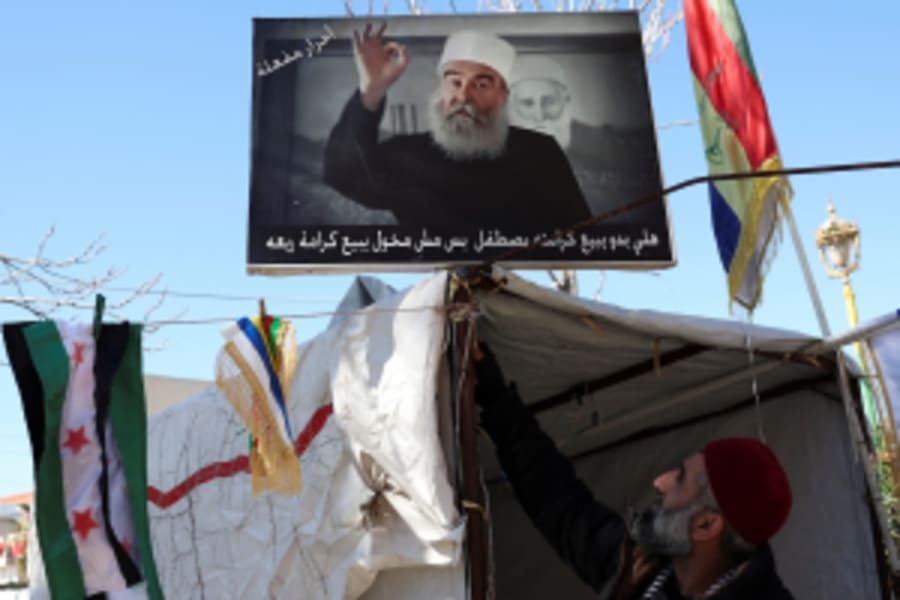Joel Rosenberg discusses what was missing from Netanyahu's speech at Congress, angry anti-Israel protesters and VP Harris' absence

Israeli Prime Minister Benjamin Netanyahu spoke to a joint session of U.S. Congress members in Washington for the fourth time on Wednesday, and ALL ISRAEL NEWS Editor-in-Chief Joel Rosenberg was invited to attend. He spoke with TBN’s Erick Stakelbeck about his experience.
Rosenberg began with the atmosphere outside the U.S. Capitol building.
“To get to the speech, I had to go through 10,000 or so pro-Hamas protesters. It was vile. There are things that I was hearing non-stop that I cannot mention on Christian television. I mean, just the obscenities, the vile hatred, “We will kill the Jews, we'll kill all of you.”
Rosenberg said there was a wide security perimeter of police outside the U.S. Capitol and noted that if security had been that strict on Jan. 6, 2021 during the Capitol attack and riots, there wouldn’t have been a problem. One Member of Congress told Rosenberg that Netanyahu’s arrival required “more security than we have normally for a State of the Union address.”
“The protesters were, violent, angry, I mean hateful, violent. To burn the American flag...I saw signs that, you know, despicable towards Netanyahu,” Rosenberg told Stakelbeck, including one that read: “Satan-yahu! Go back to Europe!” which he called “genocidal” and “demonic.”
“When you're burning the American flag and you're saying, ‘America is next.’ We saw the heart of these protesters,” he added, “These protesters don't just hate Israel and want us wiped out. They hate America.”
Inside the joint session, Rosenberg told Stakelbeck that there were a total of about 70 Democrats from the House and Senate who did not attend Netanyahu’s speech, but that this most significant absence was Vice President Kamala Harris.
“She's not just the vice president of the United States – she's the president of the Senate. She presides over the Senate, particularly during either close votes or joint sessions of Congress. And it's her job to be there. It's her job to welcome foreign heads of state to brief members of Congress in these sessions,” Rosenberg emphasized.
He said that Harris doesn’t have to like Netanyahu but he is a “wartime leader” and a “wartime ally.”
“He is the prime minister, democratically-elected prime minister of the most faithful, most trusted American ally in all of the Middle East or North Africa,” Rosenberg added.
Her decision to attend a sorority meeting in Indianapolis rather than welcome Netanyahu was “unconscionable.”
“And I think it shows the heart,” he continued.
Rosenberg noted that Joe Biden is pro-Israel, despite his inconsistency.
“One day he's not. So he's not so happy with Israel the next day. Sometimes he's hostile towards Israel. But Joe Biden is the best pro-Israel person in the Democratic Party. He's the most pro-Israel,” Rosenberg stated, comparing the U.S. president to Harris, who is now the most likely Democratic nominee for president in the next election.
When it comes to being pro-Israel, “Turns out Kamala Harris is clearly not,” Rosenberg said.
“Just hours after being given the endorsement by Biden to be the next Democratic nominee for president, and maybe the next president of the United States, she is not pro-Israel. And it couldn't have been more clear yesterday.”
Regarding the content of Netanyahu’s speech, Rosenberg said he thought Netanyahu might lay out some principles regarding a Saudi-Israel or U.S.-Saudi alliance.
“During the Trump administration, there was a real effort to try to see...if it was possible to put the United States, the Sunni-Arab friendly allies, and Israel together in some sort of Middle East NATO. That's the operative term during the Trump years.” He noted that the Biden administration has “sort of abandoned the idea.”
“But Netanyahu raised it...he would like to call it the Abraham Alliance.” Rosenberg said he used to support that idea if the conditions were right but believes an alliance against Iran is important.
“I will say I was struck, Erick, that Netanyahu didn't even mention Saudi Arabia. He signaled that there could be more peace coming and he would like to see that.
“I was surprised because I thought that he might lay out some principles by which he thinks a Saudi Israeli, a Saudi American alliance and normalization treaty could be done, maybe even this year or early next. But he didn't mention that specifically.”

The All Israel News Staff is a team of journalists in Israel.













